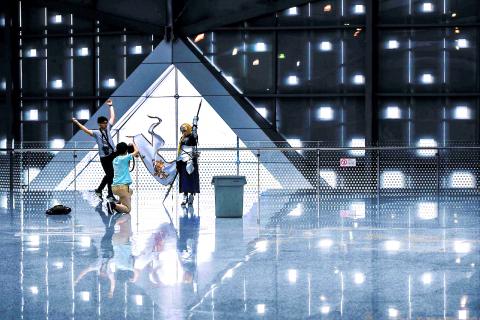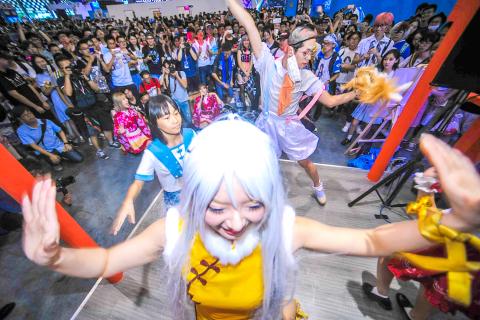Feeling trapped in her “boring” life as a member of China’s modern workforce, “Yaorenmao” escapes online, where she prances and preens in cosplay outfits for her 1.3 million fans.
Her alternative world is bilibili.com, a Shanghai-based video sharing platform that has attracted more than 150 million Chinese users with its eclectic mix of user-generated videos and animation largely inspired by the Japanese world of ACG (anime, comics and games).
Spurred in part by a shortage of engaging youth-oriented content in China where Facebook and YouTube are blocked, and media and entertainment outlets are heavily censored, Chinese ACG is developing into a multi-billion-dollar industry, analysts say, drawing investment from tech titans such as Tencent and Alibaba.

Photo: AFP
And with amateur video uploads booming in smartphone-addicted China, platforms like bilibili are fueling and capitalizing on the ease with which the average Chinese armed with a camera can attain viral celebrity.
DOUBLE LIFE
The twenty-something Yaorenmao, a pseudonym meaning “cat that bites people,” began a to upload brief DIY videos from her home in the southwestern city of Chengdu in 2011. She dances to saccharine-sweet tunes in the clips, acting out an unfulfilled childhood dream of becoming a dancer.

Photo: AFP
“I worked like a normal person after graduation [from university], but normal life and work are just too boring,” she said, withholding her real name and occupation to keep her two lives separate.
Fans accumulated, often sending gifts or money, which she plows back into increasingly elaborate costumes and settings, including a US$1,500 trip to Japan to shoot videos during the picturesque cherry blossom season.
Her fans approach her amateurish work “with a generous heart and encourage me because they want to see me getting better and better. It’s as if they are getting better and better themselves,” she says.
Based heavily on hugely popular Japanese ACG Web sites like Niconico, bilibili hooks many with its signature live-comment feature, in which waves of user remarks flow across the screen in real time, often obscuring the videos being commented on.
Bilibili chairman Chen Rui (陳睿) says Chinese millennials born in the Internet age are increasingly inhabiting the virtual world.
“Everyone is afraid of loneliness and everyone wishes for a better world where you can speak your mind and don’t have to see people you don’t like,” Chen said.
“Once you’ve seen the world bilibili created, you can never leave.”
Analysts estimate China’s ACG world has more than doubled in the past four years to around 300 million fans whose spending within the subculture averages more than US$255 per year, and some predict the industry could one day rival its Japanese forebears.
MILLENNIAL MEDIA
Bilibili offers a bewildering array of material — 70 percent of it user-generated — including role-playing, quirky personal videos like Yaorenmao’s, amateur commentary on lifestyle, tech, beauty, fashion, entertainment, games, and, of course, Japanese anime series.
Even the Communist Youth League has opened a bilibili feed containing videos extolling the ruling party.
Huang Yanhua, an analyst with iResearch Consulting, said China’s online ACG world is in a messy “beginning stage” but she expects it to serve as an incubator for successful original Chinese content.
“Each generation has their own way of entertaining. People born after the 1990s have started working and they are now the main consumption force in China, and as their hobbies become the mainstream it will change the industry landscape,” she says.
Tencent launched its own bilibili-like site, Tencent Comics, in 2012, and is now partnering directly with bilibili to produce animated videos. E-commerce giant Alibaba, through its streaming site Youku Tudou, led a US$50 million investment in bilibili rival Acfun in 2015.
Market analysis firm CIConsulting said recently China’s ACG market has become a fast-growing multi-billion-dollar industry.
Bilibili launched an annual Shanghai convention in 2013 that drew just 800 people. This year’s event in July attracted more than 100,000 uploaders like Yaorenmao and fans, most in their teens or early 20s, and many dressed flamboyantly in comic-character costumes.
Zeng Hang (曾航), chief executive of a military-themed online program called “Crazy Warfare-Show” (軍武次位面), said the virtual realm was rapidly replacing the real world for countless Chinese millennials grappling with the country’s rapid economic, technological and social changes.
“They now live in tall buildings in Shanghai and they may not even know the kid next door,” Zeng said.
Bilibili’s often-frivolous content is a salve, he said.
“People are also under lots of pressure in China so they like these things.”
“They care more about their existence in the virtual world and they are willing to spend on what they like.”

The canonical shot of an East Asian city is a night skyline studded with towering apartment and office buildings, bright with neon and plastic signage, a landscape of energy and modernity. Another classic image is the same city seen from above, in which identical apartment towers march across the city, spilling out over nearby geography, like stylized soldiers colonizing new territory in a board game. Densely populated dynamic conurbations of money, technological innovation and convenience, it is hard to see the cities of East Asia as what they truly are: necropolises. Why is this? The East Asian development model, with

June 16 to June 22 The following flyer appeared on the streets of Hsinchu on June 12, 1895: “Taipei has already fallen to the Japanese barbarians, who have brought great misery to our land and people. We heard that the Japanese occupiers will tax our gardens, our houses, our bodies, and even our chickens, dogs, cows and pigs. They wear their hair wild, carve their teeth, tattoo their foreheads, wear strange clothes and speak a strange language. How can we be ruled by such people?” Posted by civilian militia leader Wu Tang-hsing (吳湯興), it was a call to arms to retake

This is a deeply unsettling period in Taiwan. Uncertainties are everywhere while everyone waits for a small army of other shoes to drop on nearly every front. During challenging times, interesting political changes can happen, yet all three major political parties are beset with scandals, strife and self-inflicted wounds. As the ruling party, the Democratic Progressive Party (DPP) is held accountable for not only the challenges to the party, but also the nation. Taiwan is geopolitically and economically under threat. Domestically, the administration is under siege by the opposition-controlled legislature and growing discontent with what opponents characterize as arrogant, autocratic

Desperate dads meet in car parks to exchange packets; exhausted parents slip it into their kids’ drinks; families wait months for prescriptions buy it “off label.” But is it worth the risk? “The first time I gave him a gummy, I thought, ‘Oh my God, have I killed him?’ He just passed out in front of the TV. That never happens.” Jen remembers giving her son, David, six, melatonin to help him sleep. She got them from a friend, a pediatrician who gave them to her own child. “It was sort of hilarious. She had half a tub of gummies,